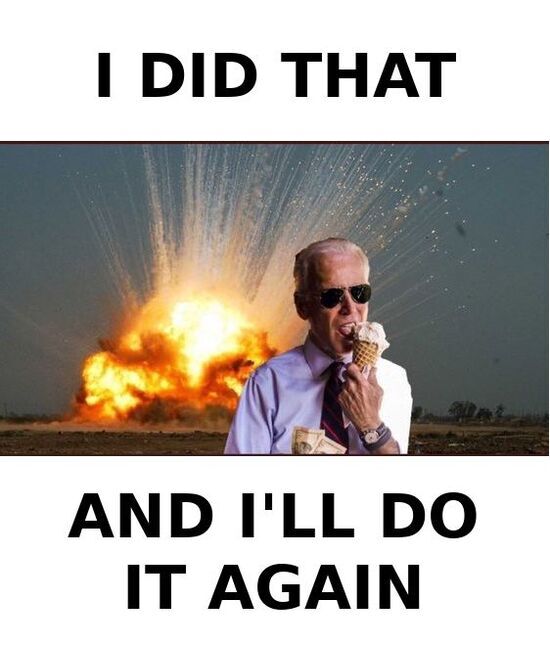Dark Brandon Increased Cybersecurity: Boosting Biden Day 112

Let’s hear it from the man himself. Biden said “Cybersecurity is essential to the basic functioning of our economy, the operation of our critical infrastructure, the strength of our democracy and democratic institutions, the privacy of our data and communications, and our national defense.”
Right from the start, Biden has been true to his word.
The Biden national cyber strategy is unlike any before it
For the first time, regulation is on the menu of a national cybersecurity strategy
The Biden administration is nearing publication of a national cybersecurity blueprint that for the first time embraces a major role for regulation.
The Biden administration has issued or is in the process of issuing a number of cybersecurity regulations using preexisting executive branch powers, such as requirements for key pipeline operators to develop detailed plans for responding to cybersecurity incidents. Congress, too, passed legislation requiring critical infrastructure owners and operators to disclose to the federal government within 72 hours when they suffer a major cyberattack.
The forthcoming strategy, led by National Cyber Director Chris Inglis’s office in the White House, builds on that approach, according to senior administration officials who spoke on the condition of anonymity because the document is not yet public.
James Lewis, a cybersecurity expert at the Center for Strategic and International Studies think tank, said: “It’s a break from the previous strategies, which focused on information sharing and public-private partnership as the solution. … This goes well beyond that. It says things that others have been afraid to say.”
Biden’s new cyber czar is pushing for collective defense inside government and out
The Office of the National Cyber Director wants to bring cohesion to efforts to strengthen computer defenses across a sprawling set of more than 100 civilian agencies even as it seeks to drive more robust cybersecurity in the private sector.
“This is the beginning, not the end” of the attempt to ensure that the United States enjoys a secure and open Internet, said National Cyber Director Chris Inglis in an interview Wednesday laying out a strategic vision for the federal government’s newest agency.
Part of that effort may eventually include cybersecurity mandates for critical infrastructure.
and this has just continued. On March 2, 2023, President Biden released the National Cybersecurity Strategy, a guiding document that has set the course for how the Biden-Harris Administration drives policy and action to defend our increasingly digital world.
For the past year, folks at the Office of the National Cyber Director (ONCD) have been working tirelessly as we coordinate implementation of the 69 initiatives identified in the first iteration of the Strategy’s implementation plan.
Federal agencies have made progress on all 69 initiatives outlined last July. In fact, more than 20 are already completed.
some examples of things done:
In partnership with the Cybersecurity and Infrastructure Security Agency (CISA), ONCD developed, updated, and published multiple exercise scenarios for the Healthcare and Public Health, Water, Maritime Transportation, Chemical, and Commercial Facilities sectors, and the election sub-sector. This empowers critical infrastructure owners and operators to prepare for, practice, and proactively improve their operations to stay protected from nation-states and malicious cyber actors that would want to do them harm.
In September, the Department of Defense publicly released a summary of its new Cyber Strategy, which is focused on further incorporating cyber into all-domain deterrence and continuing to persistently engage malicious cyber actors engaged in offensive operations against the Nation. In addition, the Department of Justice has continued to up the speed and scale of disruption operations.
the State Department Bureau of Cyberspace and Digital Policy was created just over a year ago and is working diligently to build and strengthen international coalitions to counter malicious cyber actors. In addition, the National Telecommunications and Information Administration has awarded more than $130 million in grants from the Public Wireless Supply Chain Innovation Fund that will help test the security of open, interoperable wireless networks. The shift to open and interoperable networks is vital for the development of new, open-architecture approaches to wireless networks will help to ensure that future wireless equipment is built by the U.S. and its global allies and partners – not vendors from nations that threaten our national security.
Is there still more work to be done? 100%! Lots more work. But Biden did more than many people guessed could be done. He deserves a lot of credit. AND he deserves to be re-elected.
What can you do to help?
Your donation will come bundled with others from our Good News community and will show Biden that there are many of us who support him and combine hard work with optimism in our battles for a better America!
Want to do something else?
Rec and comment on these posts to keep them alive at DKos and share them with others who might not realize how great a president Joe Biden has been.
Looking for something else? Here are some other ideas:
This is an entry in my ongoing series Boosting Biden.
Check the comments for more information on how to find other entries and subscribe.

These posts are written by Goodnewsroundup (Goodie),
edited by Matilda Briggs, and supported by 2thanks and WolverineForTJatAW
as well as several other notable Kossacks!
As with all good things, it takes a village.



